Review: Foxcatcher
Released: 9th January 2015
Certificate: 15
Director: Bennett Miller
Screenwriter: E. Max Frye, Dan Futterman
Cast: Channing Tatum, Steve Carell, Mark Ruffalo, Vanessa Redgrave, Sienna Miller
Taking its inspiration from an astounding and strange true story, Foxcatcher tells the tale of champion wrestlers Mark and Dave Schultz (Tatum and Ruffalo), and the tragic results of their patronage by billionaire John DuPont (Steve Carell) in the late 1980s.
Despite winning a gold medal in freestyle wrestling at the 1984 Olympics in Los Angeles, Mark Schultz spends his days shuffling from cramped apartment to run-down training facility, struggling to make ends meet without government support. Although much has been made of Carell’s transformative performance as DuPont (more on that later), for my money Tatum is the real surprise here. Despite his immense physical stature and outward gruff stoicism, Tatum makes Mark’s inner vulnerability painfully clear. These layers of emotional tenderness bleed through in a masterful physical performance which goes beyond the sparse conversational range of the taciturn Mark. This idea of the language of the physical runs through Foxcatcher. An early scene where Mark and Dave spar is all but devoid of spoken dialogue, but the nature of the physical contact between them- flowing in and out of long-established training positions, controlled offense and one notable moment of uncontrolled aggression- fully establishes the nature of their relationship, and foreshadows the turns it will take throughout the narrative.
Despite Mark and Dave’s unspoken but unmistakeably strong bond, the appearance of John Du Pont threatens to drive a wedge between them. Du Pont, played by Carell as an almost childish figure despite his great wealth, offers his patronage to Mark, giving him a new home on his estate and a space in which he and the other world-class American wrestlers can train. Regarding the world over a beak-like prosthetic nose, Carell’s performance paints Du Pont as a man stuck between the desire to belong and the desire to control. While at times a ridiculous figure, the audience is never allowed to forget the power that Du Pont wields over Schultz by virtue of his great wealth. The effect of that wealth and that influence on Mark is well played out by Carell and Tatum, and the film hums with a sense of brooding menace, supported by Rob Simonsen’s unobtrusive score. If a criticism can be made it is that for all the simmering tension, Foxcatcher can at times be an oddly sterile affair, perhaps easier to admire than to enjoy. Although making sense of the events which took place on the Foxcatcher estate is an impossible task, the denouement here feels somewhat rushed. Although this may have been Miller’s intention in order to bring to light the fundamental senselessness of what happened, it proves an oddly unsatisfactory conclusion to a riveting tale.
Verdict: 4/5
Image credit: sonyclassics.com
Whiplash Review
School Of Rock
Released : January 16th 2015
Certificate : 15
Director : Damien Chazelle
Cast : Miles Teller, J.K. Simmons, Melissa Benoist
Plot : Andrew (Teller) is a student at the best music school in the country and instrument of choice is the drums. He dreams of being one of the greats, and when he meets conductor Fletcher (Simmons) and become a part of his jazz, Andrew takes a step towards that dream. But Fletcher’s violently aggressive teaching methods test Andrew to both metal and physical limits.
If the film was to be judge simple on its storyline, which is written by director Damien Chazelle, its unique already. As no films worth mentioning come to mind that are about drummers, pianos are the instrument choice of the successful motion picture. Secondly, the few films that do touch on drumming are not famous from attempting to be dramas, or in anyway thought provoking. But the fact that this film focuses around drumming is a fairly irrelevant part of the film, as this storyline can be (and has been) put into any formate. The young student who dreams of achieving perfection in the chosen filed, and the mentor that attempts to take him there, and the friction that occurs.
This particular structure for the pursuit of success with teacher and student, focuses on Andrew (Teller). Andrew’s not your typical student, he lacks in friends, and connects with few people except his father. He’s a drummer at what is called the best music school in the country, and he want to perfect his skills in order to be remember as one of the great drummers. One day he is chosen by the leading conductor present at the school (Fletcher, played by Simmons) to be a part of a jazz band which competes at a national level. Thus giving Andrew the time to shine he’s always wanted, but the only issue that remains is Fletcher’s teaching methods. These methods include verbal abuse, (which ranges from degrading remakes about appearance, family issues and sexual orientation) promoting savage competition between students, violence and physical torture.
Now if one was to read the basic storyline of the film, it would sound unoriginal, the only attraction that the film would get is that the set is a drummer, a profession that hasn’t been explored in many motion pictures. But what maybe makes the film stand out against other such movies about achieving greatness, is the truly poetic screen-writing of Damien Chazelle which provides for an brilliantly layering of themes. His previous experience of writing is Grand Piano, which few will have heard of, and even fewer will have enjoyed watching. But Chazelle has managed to create a film which beautifully tackles an montage of thought provoking topics that surround success. Touching on a range of issue including, teaching methods, the pursuit of greatness, what is greatness, and how far should we be prepared to go. Thus making for a film which is surprisingly soul searching as you observe Andrew unreasonably push himself to his limits, and being pushed over the edge by Fletcher, in order to be the best. So to set aside the entertainment of the teacher / student relationship, the film provides brilliantly refreshing drama about success, unlike many other films where the main character just simple try’s really hard to get good at something, without any exploration of why and how people go about being there own vision of success. Thus making the film stunningly poetic and rich, then there’s the added delight of the show down between between the student and the master. On top of that the film manages to touch on romantic relationships, and how we appreciate them.
So the film is masterful as far as storyline and structure in concerned, proving Damien Chazelle worth as a writer, but could he perform similarly as a director. The question is best answered by the fact that he is able to make scenes in which a boy is smacking a drum set to make a funky beat, more thrilling than almost all action car chases that come to mind. Chazelle has been able to make jazz performances more enthralling and tense than many action films struggle to get close to, regardless of the amount of explosions featured. His remarkable array of movements and incredible attention to detail is truly impressive and makes for riveting view, he’s a better conductor than the musical conducts he film features. His ability to create tension made the scenes when then teacher and student went head to head all the more enjoyable to watch. Not many directors can make a film about jazz so stunningly dramatic.
Encase that the drama provided by Chazelle wasn’t impressive or scary enough, we have the main actors to push the film to the limits that the characters are pushed to. Miles Teller and J.K. Simmons scenes together are spectacularly good, both actors not being renowned for giving particularly impressive emotive performance, or portraying complex characters. With Teller coming forma supporting roles in Project X not too long ago, a film that does register on a many critical agenda nor containing notable acting, of any kind. And Simmons, who unfortunately until this point in he’s careerer is most famous for his roles in the first Spider Man series as J. Jonah Jameson, head of the Daily Bugle, in which he performed as a delightfully funny comic relief, but nothing serious. Well both actors have given the performance of their careers (for now). To see Simmons authoritarian music instructor and Tellers striking passionate drummer play it out was magical cinema and acting, making for one of the best double acts of recent years. J.K Simmons performance is electrifying to watch as he pushes his students as he says “beyond what is expected of them”. The character is almost as brilliant as Simmons visceral portrayal of the thought provoking character. Teller might be over looked as Simmons performance is so loud and energetic, but Tellers performance is touching and heartfelt. His short scenes with Melissa Benoist, who plays the Andrews grilfriend, were particularity absorbing to watch, in what is subtle but very interesting romantic sub-plot to the story.
All participants of this film have never done better before in there career by many a mile, or in many other peoples careers. Whiplash is stunning enthralling in is ability to have you on the edge of your seat to the peaceful sound of jazz, which has never been done before, enough to make the film stand out. As well as this the emotional diversity of the film makes for riveting viewing. The core story is dealt with in an inspired way, in many causes leaving audiences with something to think about for possibly a long time after the film has finished. Then on the face of Chazelles masterpieces, are two very stunningly memorable performance. Extra merit for the fact that Teller is a self taught drummer.
Verdict : It seems that Simmons, Teller and Chazelle were as aspired to achieve greatness just at much as the characters of the story, providing an incredible motion picture. Executed just as well as the music featured.
Verdict : 5/5
Quote : “There are no two words in the English language, more harmful, than good job.”
The Hobbit : The Battle Of The Five Armies Review
One Last Time
Released : December 12th 2014
Certificate : 12A
Director : Peter Jackson
Cast : Martin Freeman, Orlando Bloom, Hugo Weaving, Ian McKellen, Cate Blanchett, Richard Armitage, Luke Evans, Benedict Cumberbatch
Plot : Bilbo Baggins (Freeman) and the band of dwafs led by Thorin Oakenshield (Armitage) have driven Smaug (Cumberbacth) from the Lonely Mountain, now the dragon seeks to destroy Laketown All of Middle-earth’s eyes fall on the mountain, as armies from all across the land come to fight for the promise of the enddless gold of Erebor.
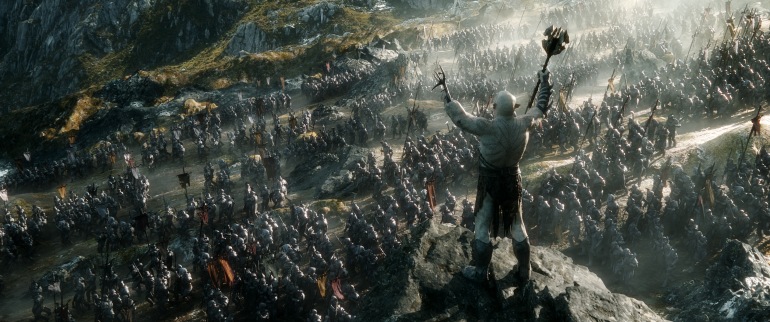 This was a emotional film for both cast, fan, and movie goer alike, as the Middle-earth saga comes to a close, and Jackson wasn’t going to leave quietly. Due to the pleasing high quality of The Hobbit series so far, with ‘The Desolation’ proving to be a better instalment that the ‘Unexpected Journey’, many were confident that Jackson would be able to complete his legacy with great strength. The Hobbit series as been by far the best prequel series to date, not that there are many to choose from, but its certainly hasn’t followed the same story as the Star Wars franchise. There will always be a special place in our hearts for Frodo and Sam’s journey across Middle-earth, but we have been overjoyed to be taken on another adventure across J. R. R. Tolkien mythical land with Peter leading the way.
This was a emotional film for both cast, fan, and movie goer alike, as the Middle-earth saga comes to a close, and Jackson wasn’t going to leave quietly. Due to the pleasing high quality of The Hobbit series so far, with ‘The Desolation’ proving to be a better instalment that the ‘Unexpected Journey’, many were confident that Jackson would be able to complete his legacy with great strength. The Hobbit series as been by far the best prequel series to date, not that there are many to choose from, but its certainly hasn’t followed the same story as the Star Wars franchise. There will always be a special place in our hearts for Frodo and Sam’s journey across Middle-earth, but we have been overjoyed to be taken on another adventure across J. R. R. Tolkien mythical land with Peter leading the way.
In true blockbuster movie series style, the finale instalment has to be big, it has to be dramatic, and it has to be violent. Well the story certain had the stage set beautifully for such a climax. Smaug (the Cumber) is loose in Middle-earth once more, and only Bard (Evans) stand between him and Laketown. As Bilbo and the dwarfs are helpless to stop Smaug descend upon the innocent villagers, Thorin starts his search for the Arkenstone, to crown himself King under the Mountain. Meanwhile as armies from all corners of Middle-earth approach the Mountain, Gandalf (the still grey for the moment) has discovered a terrible evil, a Necromancer (the Batch).
Differently to the climax of The Lord of the Rings, the journey of The Hobbit is finished as the film starts, Bilbo and the band of dwarfs have no where left to go, all that’s left to do is stand there ground, in true 300 style, with just one hobbit and thirteen dwarfs standing between all of Middle-earth and Erebor. Bur following in the same style of The Lord of the Rings, the final chapter is the most blood thirsty, with 45 minutes of this film solidly being taken up by a battle sequences, many fans going into the theatre knowing this, if they had there homework. Certainly for the younger followers of the franchise this was no issue, but did this mean that the character drama and emotional value of the film would suffer. Well it was clear from the outset that Jackson wanted to make this last instalment to be as dramatically impressive as possible, as nothing would be worse than a wimpish finale bow. Well no one can say that this film ends the saga quietly, as seeing Smaug descend on Laketown, and the battle for the Mountain between the five armies commence, did make for blistering entertainment. If anyone thought that The Hobbit sequel had been missing the large scale battles that The Lord of the Rings was so famous for will be very happy, a truly thrilling motion picture event. Unfortunately the battle for the five armies did lack in the emotion that made the return of the king such a brilliant ending to that trilogy. The chemistry between Frodo and Sam, and Pippin singing as the rider go to there immanent death, to list a few of the moving scenes from the return of the king that made it such a rich film to watch. This presence of story was not as poignant.
Despite this, to conduct not just such a large scale dramatic film, but to guide a motion picture legacy to a close is not a easy task by any stretch of the imagination, and Peter Jackson performed beautifully. If nothing else this film can be remember as Jacksons finale bow to the saga, and such an achievement will secure him in the history for cinema forever (regardless of the fact that Middle-earth saga has picked up a total of seventeen Oscars and been nominated for a further thirteen other Academy Awards). And Jackson did not falter in this chapter at all, the battle sequences where beautifully orchestrated, and yet again displayed the characters and world of Middle-earth flawlessly.
Most of the character development of this film focused on Thorin Oakenshield and Bilbo Baggins, giving less attention to the other characters disappointingly, making for some of the non-battle sides of the film to be slightly rushed. But Freeman and Armitage performed very well with the large amount of screen time that they had. Bilbos character maturing with the journey much the same as Frodo was given great life from Freeman’s performance, changing from the innocent quiet hobbit from the shire into the slightly corrupt barer of the ring has been a joy to behold for a second time due to Freeman’s performance. Thorin being the other main character the story focuses on as a key point develops as the power and pressure of being (self appointed) King under the Mountain. Armitage performance has proved to be entertainingly charismatic making him stand tall next to original cast members such as McKellen and Bloom. The amoutn of time devoted to these characters meant that we missed out on many other of the characters stories, something which was not a issue in The Return of the King.
So the emotional drama from the characters which made The Return of the King so impressive as a fantasy flick, does not have quiet the same presence in this finale. But its almost impossible to compete with a film which won a record breaking eleven Oscars. So maybe comparing the two trilogy’s, the original wins, as originals almost always do. But the discarding the originals existence, The Hobbit Trilogy is an masterful creation, and this ending chapter does the series justice. The Hobbit Trilogy has been good enough to ignore the fact that three films have been squeezed out of just one book. And The Battle of the Five Armies is as thrilling an poetic ending to a saga as anyone could hope for.
Verdict : A sensationally spectacular show down, which scale enough for an entire trilogy. Not the best instalment from the saga, but The Hobbit story has been another beautiful journey through middle-earth. The Middle-earth saga shall be missed.
Verdict : 4/5
Quote : “Farewell, Master Burglar. Go back to your books, your fireplace. Plant your trees, watch them grow. If more of us valued home above gold, it would be a merrier world.”
Review: Into the Woods
Released: 9th January 2015
Certificate: PG
Director: Rob Marshall
Screenwriter: James Lapine & Stephen Sondheim
Cast: Meryl Streep, Emily Blunt, James Corden, Anna Kendrick, Daniel Huttlestone, Lilla Crawford
In a storybook kingdom, some familiar tales are brewing. There’s a girl with a red hooded cape, a boy with a cow, a young woman cleaning up after her stepsisters and a young couple wishing for a child. Their respective desires will lead them into a dark and forbidding wood where their paths will intertwine, and singing will ensue.
Adapting theatre to the big screen is always a tricky prospect. On the plus side, the director can direct the audience’s attention precisely where they want, and the myriad of camera angles, special effects, and often (increased) star power can add up to a truly unique experience. However, it also brings challenges: how to make a film of a play truly cinematic, and what to do without the peculiar alchemy that comes courtesy of having something enfold, live, before the eyes of the audience. Adapting musicals is doubly difficult as there’s the need to make the audience believe that a collection of people would spontaneously decide to sing their feelings. The canon of Hollywood adaptations of stage musicals seems to be firing blanks at least as often as it scores direct hits. Weirdly enough, Into the Woods falls somewhere in between.
Part of the problem is that Into the Woods is more of a light opera than a musical, and struggles to overcome the challenges of a less toe-tapping libretto. Some of the longer songs drag a little despite the cast being generally more than equal to the demands of the score. Although the film proves that an all-star line-up doesn’t necessarily equal a five-star movie, there are some fantastic performances here. Emily Blunt is perfectly cast as the resourceful baker’s wife, and is able to play up the comedic and melodramatic elements while still delivering a subtle and cinematic performance. James Corden is also charming and the scenes with both of them are some of the film’s best. Meryl Streep valiantly shoulders plenty of heavy lifting narrative- and music-wise, and the younger cast (Daniel Huttlestone as Jack and Lilla Crawford as Red) both seem perfectly at home amongst the Hollywood heavy-hitters. The only real non-sequitur is Jonny Depp as the Wolf, which smacks of stunt casting and is rather overplayed.
Rob Marshall, who proved his musical mettle with 2002’s slick Chicago, delivers inconsistently here. The faster-paced songs like Act 1 Prologue and Your Fault are skilfully done, with winding camera angles injecting pace and showcasing the actors’ talents. However, the Princes’ duet Agony feels stodgy and stagey, and the sequence involving Red’s rescue from the Wolf just bizarre. Although the fairytale elements benefit from cinematic VFX (the Witch’s entrances and exits are suitably spectacular), the giants- surely a major selling point as they’re so hard to render onstage-are weirdly brushed over.
Although perhaps this is fitting as, in true fairytale style, it’s not about the giants. It’s about rules (and breaking them), longings, misconceptions, the shadow of the past and the shimmering mirage of the future, and being careful what you wish for. The scariest things in the woods aren’t the monsters, they’re the choices we’ve made and the choices that are still ahead of us. Despite the missteps, Marshall and co. understand this and the overarching theme of the piece is able to shine through, buoyed by solid (at times exceptional) performances and enough directorial verve to keep everything moving.
Verdict: 3/5
Image credit: movies.disney.com
Review: Birdman, or (The Unexpected Virtue of Ignorance)
Released: 1st January
Certificate: 15
Director: Alejandro González Iñárritu
Screenwriters: Alejandro González Iñárritu, Nicolás Giacobone, Alexander Dinelaris, Armando Bo
Cast: Michael Keaton, Edward Norton, Emma Stone, Andrea Riseborough, Naomi Watts, Zach Galifanakis.
As the old saying goes, if you bring a gun onstage in act one it sure as hell better go off in act three. In director Iñárritu’s frenetic exploration of the psyche of an ageing blockbuster star a prop gun is not only brought onstage but is waved around and accused of looking too fake. Misinterpreted Chekhovian proverbs aside, this motif encapsulates the tone of Birdman: irreverent, postmodern, with the adrenaline-fuelled pulse of a thriller pumping steadily at its periphery.
Riggan Thomson (imbued with quivering exasperation by Keaton), former star of the Birdman popcorn franchise, has now burnt through his money and is seeking to stake a claim to credibility by writing, directing and starring in a Broadway play. However, standing in his way are a jumble of obstacles, not least his own guttering grip on reality. He is haunted by the voice of his former character, who seems to have nothing more complementary to say about him than the journalists and critics (amongst them Lindsay Duncan delivering a stunningly scabrous performance) who seem affronted at Thomson’s attempts to gatecrash the supposedly serious and noble tradition of theatre.
The irony, gleefully explored by Birdman, is that the theatre, not least Riggan’s narcissistic and demanding co-star Michael Shiner (Edward Norton), is just as fraught with pitfalls and nonsensical non sequiturs as tinseltown. As the camera follows Riggan through the green rooms, corridors and lighting rigging of the theatre (few sequences take place outside of it), panning to catch a conversation or take in action happening in a wider frame, the audience becomes part of Riggan’s perceptual state. Time shifts unevenly- a pre-rehearsal conversation gives way suddenly to the first preview night- and fantastical elements appear and dissolve, creating an enjoyable puzzle surrounding what might be real and what might be imagined. The imagery gleefully oscillates between ethereal and earthy, with one conversation between Riggan and his ex-wife (Amy Ryan) taking place while he lies prone on the countertop in his grungy dressing room in an eerie facsimile of a wake. That is not to say the film ever becomes languorous or dreamlike in an obvious sense. On the contrary, Antonio Sanchez’ corybantic drum score drives the action forward as Riggan and co. hurtle towards opening night, and the disaster or salvation it may bring.
The ensemble of strong performers and equally strong characters elevate Birdman, allowing the script to have its intended impact. Zach Galifanakis excels in a rare straight-man role as Thomson’s frazzled producer, Jake. Emma Stone makes everything looks easy beyond daughter Sam’s intimidating fortress of eyeliner, and makes an impact beyond the modest amount of screentime the story allows her. Supporting thesps Lesley (Naomi Watts) and Laura (Andrea Riseborough) nurse motivations and insecurities of their own while the collaboration-cum-rivalry between Riggan and Shiner (creatures composed entirely of motivations and insecurities), which threatens to bubble over both on and offstage, is a joy to watch.
All of this adds up to a spectacle of skilfully deployed chaos which waxes philosophical without taking itself too seriously, offering a satirical commentary on the business of theatrical entertainment. Admittedly, it sometimes gets a little caught up in its own excesses (a kiss between Lesley and Laura is hard to interpret as anything but pure voyeurism), and the lack of racial diversity in the cast is concerning. However, overall it is a very enjoyable piece. Cinéastes will relish tying themselves in knots attempting to unpick the clues to interpreting the cheekily ambiguous ending, while everyone else can just enjoy being along for the ride.
Verdict: 5/5
Image credit: youtube.com/user/FoxSearchlight
Mini Review: The Boxtrolls (2014)
Released: Available on DVD, Blu-Ray and on demand 26th January 2015
Certificate: PG
Directors: Graham Annable, Anthony Stacchi
Screenwriters: Irena Brignull, Adam Pava
Cast: Ben Kingsley, Jared Harris, Dee Bradley Parker, Isaac Hempstead Wright, Ellie Fanning
In a pseudo-Victorian city perched precariously on a mountaintop, the residents are plagued by night-time invasions of marauding trolls out to steal their possessions and their children- or are they? The latest stop-motion animation from Laika studios (Coraline, Paranorman) rattles along gleefully, bringing a cast of plucky youngsters, dastardly villains, and preoccupied, cheese-obsessed aristocrats along for the ride. The worlds above and below ground are well thought out and eye-poppingly detailed, and the gags are good. Any kids with a predilection for the macabre will be thrilled with the grottier-than-average rendering of the world of the titular beasties. Unfortunately, the film’s message of tolerance is marred somewhat by a failure to challenge the stereotypical association of male-to-female cross-dressing with deception and villainy. This is a great disappointment in a picture which is otherwise warm-hearted, funny and visually arresting.
Verdict: 3/5
Quote: “The unspeakable has happened. We must speak of it at once!”
Image credit: theboxtrolls.co.uk/gallery
Recent Posts
Archives
- September 2017
- February 2017
- January 2017
- November 2016
- October 2016
- September 2016
- June 2016
- April 2016
- March 2016
- February 2016
- January 2016
- December 2015
- November 2015
- October 2015
- September 2015
- August 2015
- July 2015
- June 2015
- May 2015
- April 2015
- March 2015
- February 2015
- January 2015
- December 2014
- November 2014
- October 2014
- September 2014
- August 2014
- July 2014
- June 2014
- May 2014
- April 2014
- March 2014
- February 2014
- January 2014
- December 2013
- November 2013
- October 2013
Categories
- 1961
- 1982
- 1985
- 2010
- 2011
- 2012
- 2013
- 2014
- 2015
- 2016
- 2017
- 2D
- 3D
- Cinema
- Classic Reviews
- Collections
- DVD
- films
- Genre: action
- Genre: animation
- Genre: biopic
- Genre: comedy
- Genre: drama
- Genre: fantasy
- Genre: horror
- Genre: LGBTQ
- Genre: musical
- Genre: period drama
- Genre: sci-fi
- Genre: superheroes
- Genre: thriller
- Genre: western
- Netflix
- Preview Article
- Rating: 1/5
- Rating: 2/5
- Rating: 3/5
- Rating: 4/5
- Rating: 5/5
- Reviewed by: AES
- Reviewed by: SO
- Reviews
- Top 5 List
- Uncategorized
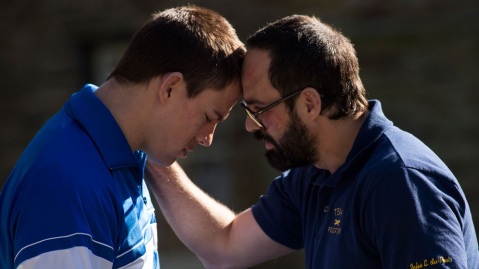
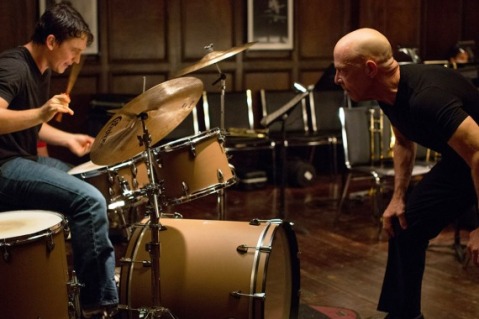
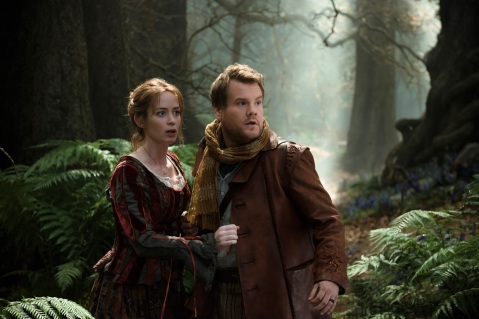
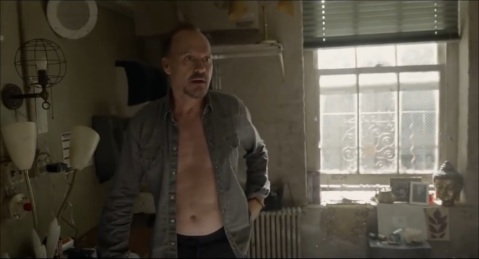
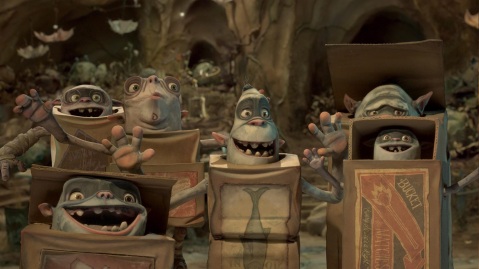
Recent Comments